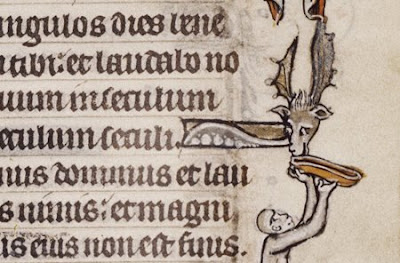At this point, we’ve all gotten the email at least once. No, I don’t mean the one from the Nigerian male enhancement lottery asking us to validate our eBay account information, but, you know, the one titled something like “Famous Sayings Explained” or “You’re Quoting Shakespeare (even if you don’t know it).”* As a service to my readers, I’d like to share my own remarkable discovery that I have recently made regarding an increasingly common phrase and its unlikely medieval origins.
 Why is this stag so happy? Because he can see the rest of the image, which I am still cleverly hiding from you. Now, quickly, record your guesses in your notebooks and pass them to your neighbor. Ready?
Why is this stag so happy? Because he can see the rest of the image, which I am still cleverly hiding from you. Now, quickly, record your guesses in your notebooks and pass them to your neighbor. Ready?
As it is no doubt now clear, the phrase I had in mind was, “Tap dat ass.” Stodgy professorial types may recognize this as one of those things said by “those kids today, with their clothes, and their shoes, and their clever euphemisms for knowing someone in the Biblical manner…”
If you’ve never heard it, here’s the phrase used in context in Ludacris’s Fantacy:
Table top or just give me a lap dance.
The Rock to the Park to the Point to the Flatlands.
That man Ludacris (woo) in the public bathroom,
Or in back of a classroom–
How ever you want it lover-lover,
gonna tap dat ass soon.
For my philologists, other attested variants include the less frequent “tap that ass” and “tap dat azz.”
Anyway, for those of you who think perhaps this is an elaborate joke of the form “make an outlandish claim and then continue to delay for as long as possible until you reveal your original claim was only justified in a very narrow sense,”** have I got your comeuppance! Here’s the rest of the image, which until now our happy stag and I alone have been privy to:

Quod erat demonstrandum. Tapping that ass is something that dates back to the Middle Ages, practiced by monkeys–and, occasionally, storks.
Why has it taken so long for this discovery to come to light? Possibly, it’s because the Bodleian’s catalogue entry for this image consists of “Scenes of daily life: stork, apes, stag-headed line-filler.” The prudes.
I have every confidence that my discovery will net me a guest posting spot at the Language Log, if not a book deal and a seven part BBC special.
—
*From which I learned, for instance, that F.C.U.K. clothing company‘s name comes from the medieval phrase “Fornication Consented to Under the King’s [jurisdictional power]”.
**A form, incidentally, also used for most academic papers.